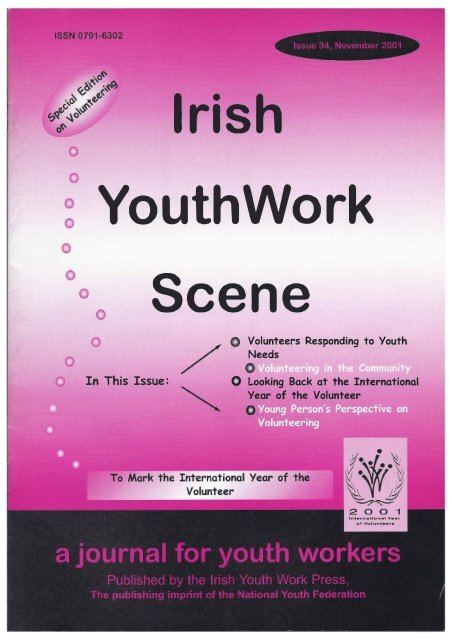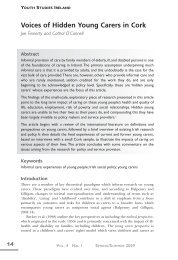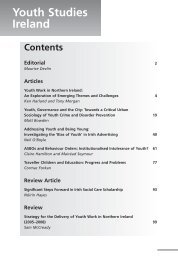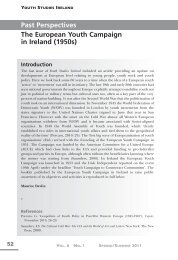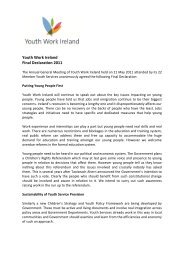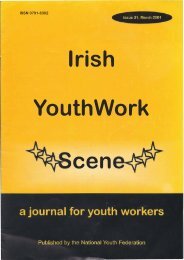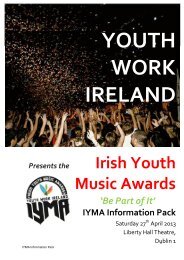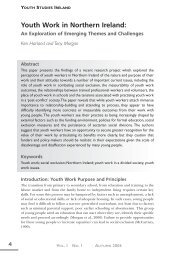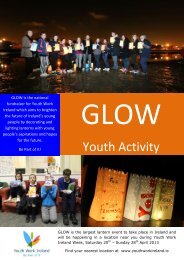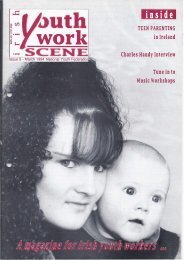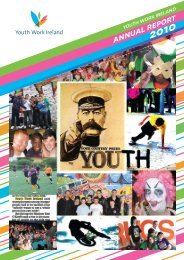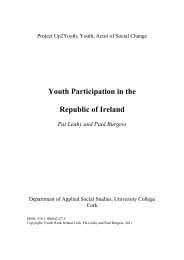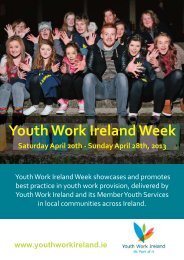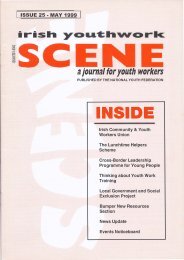Issue 34: November 2001 - Youth Work Ireland
Issue 34: November 2001 - Youth Work Ireland
Issue 34: November 2001 - Youth Work Ireland
You also want an ePaper? Increase the reach of your titles
YUMPU automatically turns print PDFs into web optimized ePapers that Google loves.
Irish<strong>Youth</strong> <strong>Work</strong>0SceneVolunteers Responding to <strong>Youth</strong>NeedsIn This <strong>Issue</strong>:0 Looking Back at the InternationalYear of the Volunteer0
The Minister of State Mr Wil lie O'Dea has co mmitted to see theproposed <strong>Youth</strong> <strong>Work</strong> Bill written into law this side of Christmas.Such a development would be a timely and appropri ate reward for allthose who have worked significantly hard to ensure that youth work ,in its many forms, is given due regard, due respect and ultimatelydue resources.It behoves the Minister to ensure, notwithstanding the passing of theBill into law, that the present discussion of cutbacks does not affectthe emerging potential of youth work both in the light of the legislationbecoming law and more importantly, the co nsensus reflected withinthe drafting of a National Yo uth <strong>Work</strong> Development Plan. TheProgramme for Prosperity and Fairness gave a written commitmentto ensure the National Yo uth <strong>Work</strong> Development Pla n wo uld beresourced . This opportunity is a fu rther occasion when the Ministerca n fulfi l! his co mmitments to the sector. Costings fo r theDevelopment Plan, which will ultimately try to establish us on a newfooting (not merely catch-u p in snail like fashion) wil l requiresignificant resources. Priorities will have to be set with incrementalsteps fol lowing , thus securing a stronger delivery of youth servicesthroughout the co untry over the next five years.A clear priority within the implementation of the National Yo uth <strong>Work</strong>Development Plan 2002-2006 should be a Fu nding Review.Objective benchmark funding standards must be agreed which willsee sufficient and competitive fi nancing of youth work delivery acrossall Government Departments as quickly as possible. Within th isreview the most crucial issue is the urgent need to establishcomparable salaries for staff within the sector that are transparentlyfu nded by the Yo uth Affairs Sectio n of the Department of Educationand Science. Where excellent experience and expertise has beendeveloped among current staff, this cannot co ntinue to be lost tobetter paid jobs in other sectors. People do move on but it is a pitifulindictment of the sector that in many cases 'moving on' is to betterpaid jobs when the hearts of those leaving would prefer to beresourced adequately and fairly within work that they themselves arehugely committed to and yet. from an economic point of view, theyca nnot continue to accept.Strong negotiation and representation of youth work shou ld havealready taken place in anticipation of implementing the <strong>Youth</strong> <strong>Work</strong>Bi ll and the Development Plan 2002-2006. We will know where westand and what is possible shortly when the allocations withi n theBook of Estimates are presented in detail. To announce theimplementation of the Plan with a Funding Review as the first step (inorder to infl uence preparation for next year's Estimates process) and,to provide an annual increase in line with the infrastructural costs,particularly, co mpetitive sa laries, will be a hu ge step forward.Hopefully we are nearly there!Irish <strong>Youth</strong><strong>Work</strong> Scene•
ternational Year of the VolDecember 5th will probably herald the completion ofmost official volunteering recog nition activitiesworldwide. For many organisations the year has cutdeeper than purely celebration activities. Reflectionupon, and questioning of the strong tradition ofvolunteering in I reland, indeed on the planet hasbeen a significant aspect of the year.For us here at the Vol unteering <strong>Ireland</strong> (formerly theVolunteer Resource Centre) preparations for theyear began in 1997 wh en the UN Assemblyproclaimed <strong>2001</strong> as the International Year ofVol unteers. Feeding into the White Paper andencouraging and supporting the notion of the settingup of some sort of national forum to do somethingconstructive around vol unteering for the UnitedNations International Year of the Volunteer was alen gthy process. In September 2000, thegovernment published the white paper "Aframework for supporting voluntary activity &developing the rel ationship between theCommunity and Voluntary sector" fol l owingwidespread consultation. The white paper seeks to"formulate a coherent strategy and identify thepolicy response at National, Regional and locallevels which will most effectively address theissues raised during the consultation process".to address issues that concern them and tospeak directly on issues that affect them. But wecan also see the strains that voluntaryorganisations are under in today's society".National Commi tteeAt Volunteering <strong>Ireland</strong> we hope the resulting actionswill have a resou nding effect on theway wevolunteer, recruit and manage volunteers and onhow volunteering is perceived in the long term. Thisyear, the National Committee on Volunteering, uponwhich Volunteering <strong>Ireland</strong> is represented, hasfocused mainly on celebrations with:• A grants scheme to support volunteering projectslaunched in March,• The issuing of a celebration pack for nationwidedistribution ,• Creation of a National Committee on Vol unteeringwebsite ,• Commissioning & publication of poems ce lebratingthe role vol unteers have played in shaping Irishsociety,• A major cross border conference "Tipping thebalance" aiming to reach a shared vision onsupporting volu nteering• Finally, the presentation of sculptures designed byAlan Ardiff to all local authorities across the countryto mark the contribution of vo lunteers in their areas,will take place on 1 O December.On 5 Decembe r 2000, United Nations InternationalVolunteers Day, the National Committee onVoluntee ring was launched, chaired by Chris FloodTD. At the end of 2002 detailed recommendationson the range of supports needed in order topromote, sustain & develop volunteering will besubmitted by the National Committee to Governmentfor consideration."Volunteering benefits all aspects of social lifeand helps to create a real sense of citizenship. Astrong democracy enhances and protects thecapacity of citizens to participate directly insocial life, to create their own social movementsNext year the deliberations of the NationalCommittee on Volunteering and therecommendations it makes to the state along withthe report from the White Paper ImplementationCommittee will decide the future of the State'srelationship with the community and voluntary sectorand the support systems that will be set up. The callfor submissions on how this can best be achievedhas gone out and to date over 70 submissions fromorganisations and individuals have been received.Among many recommendations made byVolunteering <strong>Ireland</strong> to the National Committee are:• The necessity for continuing to recognise explicitlyand universal ly the value of volunteering• That the issue of a combined workforce involuntary organisations consisting of volunteers,paid staff and participants on FAS schemes shouldIrish <strong>Youth</strong><strong>Work</strong> Scene•<strong>November</strong> <strong>2001</strong>
Meeting <strong>Youth</strong> NeedsChanging WorldIn this article Tom Coppinger,Chairperson of the National Councilof Foroige ... calls on Foroigeleaders and all volunteers in theyouth work sector to use theoccasion of the United NationsInternational Year of Volunteers toreflect on their work and considehow they can continue to progresstowards meeting the needsyoung people in Irish society.What makes a volunteer? Perhaps a desire to helpa worthy cause, or get involved in the localcommunity, or assist a sporting organisation, orsimply as a social outlet, or it may be a matter offollowing in a family tradition.Some people are convinced that all of us must begetting something out of our voluntary work. Theycannot believe we are doing it for nothing. In a realsense, they are right. While we are getting nothingmaterial from our voluntary work we certainly aregetting something personally rewarding. We aregetting that feeling of satisfaction that comes fromknowing we are making a difference within our localcommunity and within our society as a whole. Weare helping to enhance our local communities and toimprove the quality of life for many people.In this, the United Nations International Year ofVolunteers, voluntary action is called for more thanever to meet human needs and solve problems insociety. However, there is some evidence thatvolunteering is on the wane.Significantly, there is important evidence that menare not coming forward to volunteer in For6ige Clubsas they used to in the past. Our figures show a 10%drop over the last 10 years in the proportion of malevolunteers in For6ige. We should take theopportunity of the International Year of Volunteers torecruit more men as voluntary leaders.Personal development and community developmentare fundamental to For6ige. Our organisation'spurpose is to enable young people to involvethemselves consciously and actively in their owndevlopment and in the development of society.Their own development involves matters such asgrowing in useful knowledge and skills, growing inensitivity towards others and their needs, growingin awareness of one's strengths and weaknessesand developing a sense of one's personal dignity.Development of society involves contributingsome shape or form to the well-being of others. Thismight be improving the physical environment,fundraising for a good cause or innumerable otheractivities.Every young person has a right and an obligation tocontribute to both their personal development andthe development of their commun ity, to becomewhat they are capable of becoming and to put theirmark upon the worl d.inThey must experience thevalue of service to others and the common good.This is why we volunteer our time and our energyand this is why we need to recruit others to join us.The bonus for us personally is that it is also one ofthe means by which we put our mark upon the worldand fulfil part of our vocation in life.It is one of thereasons why we are privileged to be youth leadersand why we need to reflect on our youth work and toassess to what extent we are achieving ourfundamental purpose. Are we contributing to thecommunity? Are we helping our young peoplebecome better persons?Irish <strong>Youth</strong><strong>Work</strong> Scene•<strong>November</strong> <strong>2001</strong>
Taking Ownership ofYour Own CommunityIn 1975 I was one of the three representatives of theNational Federation of <strong>Youth</strong> Clubs who, with delegatesfrom our sister organisations in the U.K. and Denmarkwere planning what became the European Federation of<strong>Youth</strong> Clubs. In the meetings, discussions and study visitsbetween the three countries in advance of that, I realisedin a new way that we had something special and in manyways unique in <strong>Ireland</strong> that was genuinely envied bysocial and community workers in other countries, theextent and importance of voluntary involvement andcommunity based organisations. As a social work studentin London University six or seven years before that I wasconscious of the strong desire of the various Londonboroughs to try to rediscover voluntary commitment andre-energise local community effort and they wereprepared to make vast sums of money available torecreate an attitude and an involvement which had beenlost.Later for over 20 years in the Gorey area I was toexperience at first hand the huge commitment of largenumbers overlong periods in a myriad of community andcaring groups which improved the services, facilities andopportunities in many local areas in North Wexford. I fearthat in the 1990's things began to change quitedramatically and if not halted and reversed we may findourselves in just few years with seriously shrunkencommunity services and opportunities and communitieswhich are more fragmented with less and less people whoare prepared to take ownership for their own communityand its development, less sense of a common purposeand shared vision. In most areas and organisations it isincreasingly more difficult to get people to make the longterm commitment to projects and committees. Many longestablished groups find it virtually impossible to replacemembers who have moved on or retired.There is one other fairly recent trend that is worthreferring to: Among the plethora of new statutory specialprojects and committees it can be more difficult to getadequate recognition and state funding for mainstreamand long established voluntary groups and projects. Forexample there is research from the U.S. showing that adisproportionately large amount of new funding (up to75% in some cases) goes to new projects or planning andresearch. The whole statutory support and funding forcore mainstream voluntary effort which we all tend to takefor panted and I will comeback to this point later.To sum up there are two features of contemporary <strong>Ireland</strong>which cause me considerable anxiety. The first is thedominance of self-interest over a sense of compassion, adisregard for the interest of others, growing isolation fromcommunity life, an unwillingness often to even listen to adifferent point of view. The second is the negligible degreeand negative nature of participation in <strong>Ireland</strong> today. Toofew people bother to have an interest in or concern for theaffairs of their local community or society generally untilsomething goes wrong and there is a problem, whereonpeople too often will follow like sheep the one who bleatsthe loudest.Against this sort of background I think it is particularlytimely that the United Nations should have designated<strong>2001</strong> as the International Year of the Volunteer and I knowhow in the past such specially designated years have ledto new thinking and action and in the case of years of theyoung people, the elderly, children and the handicappedto special new provisions in North Wexford.I welcome especially the decision of The Echo inconjunction with Gorey Community Social ServicesCouncil to publish a monthly feature right through the yearon the work of volunteers in North Wexford and I feelhonoured to have been invited to contribute the firstarticle.Fundraising paradoxically is much more problematic.Many of the well established core services and.mainstream community organisations began in the1970's, which in many ways was a golden age of socialconcern and community involvement. At that time if youhad a half decent idea and sought public support for it,large numbers of volunteers came forward and the fundswere raised relatively painlessly. All that is in fairly sharpcontrast with the experience of many community activiststoday. I have heard many such activists claim - and Iwould feel the same - that many of the things that wereinitiated in those years would be pretty well impossible ormight not tic attempted today.On January 1st R.T.E. Radio had some excellentprogrammes marking 75 years of Radio Broadcasts. Oneof the programmes I tuned in to was where a panel wasdiscussing social changes that period. They were allagreed that there was a serious decline in theneighbourliness and community involvement and that theold extended family was a thing of the past. As I havesaid, one of the richest, positive and most enrichingfeatures of Irish social and community life traditionally hasbeen the extensive level of voluntary involvement. WeIrish <strong>Youth</strong><strong>Work</strong> Scene•<strong>November</strong> <strong>2001</strong>
ain mechanisms that deal with these physical acts,picking up uncertainty and attempts to deceive. On theInternet, the mind is present but the body is gone.Recipients get few clues to the personality and mood ofthe person-typist, can only guess why messages are sent,what they mean, what response to make. Trust is virtuallyout the window. It's a risky business"In the last decade <strong>Ireland</strong> has become wealthy,cosmopolitan and confident but the Celtic Tiger has aserious down side. Patrick West had an article in theLondon Times on 27th of August 2000 entitled "Is CelticTiger Top Cat?" and concluded with this paragraph"Modem <strong>Ireland</strong> would be anathema to them(DeValera and Pierse) because in its almost slavishadherence to Thatcherite values, its increasing racialtensions, its distinctively handoffish attitude to theChurch and its loyalty to sexual and politicalliberalism, <strong>Ireland</strong> has become well, so English".Fr. Harry Bohan in the major conference he organised andthe seminal book that he edited on the theme "Are weforgetting something?' argues very forcefully that weneed to combine economic success with spirituality,justice and community. He says that how we rediscoverour sense of soul/roots/place/people could be our greatestcontemporary challenge. What does this communityrebuilding involve? How can it become a reality.The Second Vatican Council said;"Today there is a special obligation of makingourselves the neighbour of absolutely every personand of actively helping them whenever they comeacross our path; whether he is an old personabandoned by all, a foreign labourer unjustly lookeddown upon, a refugee, a child born of an unlawfulunion and wrongly suffering fo r a sin he did notcommit, or a poor man who disturbs our conscienceby recalling the voice of the Lord As often as you didit to one of These, the least of my brethren, you did itto me'. Christ himself was concerned not withhimself, but with others and he expects no Jess fromhis followers"If love and service are the distinguished mark of thegenuine Christian, the same applies to the Christian state.The basic test of the Christian society and community isthe extent to which both in statutory and voluntaryprovisions, it helps those who are underprivileged whethereducationally, socially, physically, materially, mentally,psychologically and so on.We are continuously reminded of the great strides wehave made; we are a young nation, vibrant, creative,enterprising, successful, sure of ourselves. ThePresbyterian Herald a few years ago commented 'Thenew dawn has created new possibilities of prosperity andfulfillment for our citizens. This hopeful sunrise has put toflight time dark and dreary old <strong>Ireland</strong> of servility andpoverty. All Christians are glad to see the end of thosemiserable times". It also highlighted questions for theChristian and warned."New prosperity makes possible, new kinds of sin".Mary Kenny in "Good-bye to Catholic <strong>Ireland</strong>" asks "wonder what bleak philosophy our generation willeave behind".The question encapsulates a challenge for Irish societyand the Churches, Do we have a philosophy, which isother than bleak? Do we have a Gospel, which will serveas a glowing light in the darkness?This article was written by Fr. Walter Forde at theinvitation of the Gorey Community SocialServices Council to mark the International Yeaof the VolunteerRev. Walter Forde, son of Walterand Kathleen Forde (nee Roche),was born in 1943 in Bunclody. Hewas educated at BunclodyNational School (1949-56) wherehis father was Principal Teacher,St. Peter's College, Wexford,1956 to 1961, Maynooth College1961-1969, London University,Non Residential Diploma course1969-1972.He was ordained at St. Patrick's College, Maynooth onJune 16th, 1968. Having completed a Post Graduatecourse at Maynooth, 1968-69 he was on the teaching staffat St. Peter's College from 1969 to 1973 when he left tobecome General Secretary of the National <strong>Youth</strong>Federation, 1973-1974. He was appointed C.C. in Goreyon 31 August 1974 and became Chairman of GoreySocial Services for the Diocese of Ferns and Chairman ofthe Religious Press Association of <strong>Ireland</strong>. He is author ofseven books and editor of nine others and has writtennumerous articles on social matters.In 1988 he was selected as County Wexford Person of theYear and in 1998 he recei"'._ed the Lifetime Award of theReligious Press Association. In June 1988 he wasappointed Chairman of C.M.T., the Inter ChurchCommittee on local radio, presenting a weeklyprogramme on South East Radio. He was a foundermember of the Byrne/Perry Summer School. In 1987 hewas made a life member of the National <strong>Youth</strong> Federation.He became parish priest of Castlebridge in October 1996Irish <strong>Youth</strong><strong>Work</strong> Scene<strong>November</strong> <strong>2001</strong>
Crazy or Caring?the examples of good Christian youth in their lives are fewand far between. They see a good nature amongst us andwill hopefully follow by example.SO, here I am, surrounded by at least 15 (I'd count themif they'd only stand still for long enough) boys agedbetween six and eight. Boys? Hmmm ... I think the termRASCALS would be more appropriate! Of course theirusual capering has been increased and intensifiedbecause of the three unfamiliar faces in the hall, minebeing one of them. They are eager to show us who'sboss!I'd be lying if I said I didn't question my sanity atvolunteering for the job of Beaver Leader, whilst standingamidst the little rioters. My two fellow trainee leaders'faces reflected my own apprehensive yet bemusedexpression. The three of us had volunteered the previousweek and having undertaken many a baby-sitting job wepresumed we could look after a group of young boys withease. We hadn't known WHAT was in store for us!!Now, don't get me wrong - not once did I regretvolunteering. I rise to the challenges that await me with agrin on my face. I am an enthusiast and a fighter.However, I'm also quite patient and accepting. I find thatfellow leaders missing one of these qualities, either treatthe Beavers in an angry manner, talk to them in aninappropriate way or give up on disciplining themaltogether. Patience is a virtue and probably the singlemost important attribute someone dealing with people ofany age should have, especially in dealing with children.From the beginning I noticed that the Assistant Leaderdealt with the children in a patient and experiencedmanner. I highly respect the Head Beaver Leader for he isever virtuous - from the moment I arrived in the Scout DenI noticed the patience with which he dealt with each child.The immense respect the boys have for him is clearly notthe kind of respect one gains through fear but the kind ofrespect one gains through admiration. If, one day, theBeavers respect me half as much as they do him, I willhave achieved my own personal goal.As our first night as Beaver Leaders drew to a close, Iknew the job I had undertaken was not only aresponsibility to the flock of sheep I was shepherdess to,but to myself as well. The boys were certainly a handful -in fact all five of us had our hands full. The ·mind bogglesto how they managed without us! I did perceive almostimmediately that a couple of them seemed to be at theroot of the trouble while some of the others were merelyinfluenced by them. I refused to throw my hands up in theair and give up on the more troublesome of the lot. Ourtime with all of them is very beneficial as in some casesThe atmosphere in the Beaver meetings is one of fun asis in most youth groups. There is a lot of learning involvedin what is a non-academic scene, for both the participantLeader- whether it's learning how to listen, how to interactand co-operate, how to behave appropriately, or how todeal with different ·situations. I cannot see anydisadvantages in an environment like this where there isinteraction between children from different backgrounds.This is a valuable experience for them not only at the agethey are now but also for later life.Before I volunteered as a Beaver Leader I felt as thoughI was taking so much out of society without puttinganything back. I participated in Scouts for four years andI now participate in Ventures. I now appreciate the amountof work our Leaders put in for us and continue to put in.Finally, I am giving something back to the system andusing my attributes and time to add to society. By lookingat my work with Beavers as a challenge, I am fired toencourage and help them and encourage others tovolunteer. People need encouragement -a little pushalong the way, so to speak. For me, this came in the formof the Gaisce award. Gaisce and other similarly structuredawards are great forms of encouragement as theparticipant has a goal in mind and the sense ofachievement after the presentation of the award urgesthem to continue on with voluntary work.I get an immense sense of satisfaction and self-worthwhen I see the impact of my work and time with Beaversand the enjoyment they get out of meetings. It is a regularoccurrence for me to arrive home from Beavers as highas a kite because of a lesson learnt, a problem solved orthat wondrous feeling that those young lads were hangingon my every word ... or even on ONE word - just the hintthat they were taking heed! So, bearing in mind the yearthat is in it, 'The Year of The Volunteer,' I think aconsiderable amount of thought should begiven tobecoming a volunteer. Volunteering is a big part of my life;let it be a big part of YOURS.Natalie Coles is a transition year student inColaiste i osagain and is actively involved in the29th Scouting Unit, Blackrock under theauspices of Scouting <strong>Ireland</strong>.Irish <strong>Youth</strong><strong>Work</strong> Scene•<strong>November</strong> <strong>2001</strong>
Plicy & Fundingcurrently serving a sentence for a sex offence.A new system of tracking sex offenders came intoeffect with the introduction of the Sex Offenders Act<strong>2001</strong> on Thursday 27 September, <strong>2001</strong>. Under thenew laws, the Gardai will be informed at all times ofthe current names and addresses of convicted sexoffe nders, who will also have to notify the Gardai ofdetails of any trips abroad lasting more than tendays. The notification system will also apply to sexoffenders who enter <strong>Ireland</strong> from abroad. Anyoffender who has received a custodial sentence ofmore than two years will be obliged to notify theGardai of their whereabouts for the rest of their lives.On 20 July the co mposition of The Implementation &Advisory Group for the White Paper on a Frameworkfor Supporting Voluntary Activity" was announced.·The group will have the dual task of leading theimplementation of the White Paper'srecommendations while providing a forum fordiscussion between the voluntary sector and theState on related issues such as financing, trainingand development and the introduction of aregulatory framework for the sector.The tracking system is one of six elements thatcome with the Act. The other provisions include:• The Civil Sex Offenders Order agai nst sexoffenders covers behaviour in the community thatgives the Gardai cause for concern. Gardai canapply to the civil courts for an order restraining theindividual. The order can be applied to both peoplewho have offended, and to persons whose actions,while not technically criminal, give cause forconcern in the community. The order will prohibitsex offenders from doing things such as loiteringnear school playgrounds.• A new system of post-release (from prison)supervision for sex offenders.• It will be an offence under the Act for sex offenderto seek employment where unsupervised accessto children is involved.• Separate legal representation in rape and otherserious sexual assault cases in certaincircumstances.• An increase in the maximum penalty for sexualassault from 5 years to 14 years where the victimis a child and 5 to 10 years where the victim is anadult.In announci ng the introduction of the Act TheMinister for Justice, Equality and Law Reform MrJohn O' Donoghue, T. D., also confirmed thatmeasures had been enacted to facilitate theregistration of all those convicted of sex offences orThe 12 member Group is drawn equally from theCommunity and Voluntary sector and the relevantGovernment Departments. It will be co-chaired bythe Department of Health & Children and theDepartment of Social, Community & Family Affairs.The Group's terms of reference are to:• Advise on a programme of research, which willinclude quantifying the full extent of communityand voluntary activity in <strong>Ireland</strong>• Agree protocols for financial accountability inrespect of State funding of the sector• Monitor administrative mechanisms to underpinthe effective functioning of the working relationshipand discuss and agree proposals that promoteintegrated approaches at national level• Monitor developments in accreditation of trainingfor the sector• Formulate practical proposals to further enhancesupport and training capacity within the sector andwithin other sectors• Advise on the development of a regulatoryframework for the sector• Examine areas of overlap or gaps in statutoryresponsibility with regard to support for theCommunity and Voluntary sector at policy andprogramme level and make recommendations toresolve such situations• Advise on the distribution of the £2 millionproposed provision for other Federations andIrish <strong>Youth</strong><strong>Work</strong> Scene-<strong>November</strong> <strong>2001</strong>
see this principle at work in youth services, education,personal social services, and community development.As I have said one of the richest, positive and mostenriching features of Irish social and community lifetraditionally has been the extensive level of voluntaryinvolvement. We see this principle at work in youthservices, education, personal social services, andcommunity development.Voluntary organisations pioneer work which the state maylater take over; sometimes they do work which statutoryorganisations cannot effectively do or simply are notdoing and they act as pressure groups or critics inconnection with statutory services and social needs.Voluntary provided and community based services arenot something imposed from outside by an all embracingstate but are a concrete expression of a progressivesocial and democratic philosophy. One of the interestingfeatures underlined by the working and growth of theseorganisations is the importance of the principle of theseorganisations in caring. Voluntary and statutory action arenot the antithesis of each other. They spring from thesame roots; are designed to meet the same needs andhave the same motivating force behind them. It was thelate and great Lord Beveridge one of the architects ofmodem social policy in Britain who saidexisting effective programmes and initiatives in thecommunity and help strengthen and attend these.One of the more important developments then of the lastthree decades in <strong>Ireland</strong> has been the development ofbroadly based Councils with an overall concern for thewelfare of the town/community in which they live andefforts to plan, initiate and develop new services andimprove and extend existing ones. Constructive andbroader thinking of this kind over the last three decadesor so has led to the development of Social ServiceCouncils/Community Councils/Community ServicesCouncils.These Councils (and there are between three to fourhundred of them in the country) emphasise that they arenot separate organisations and do not interfere with theautonomy of member groups, they consist of theorganisations that make up them. The widening andmaking more sophisticated of the range of personal socialservices has largely been associated with thedevelopment of the Social Services Councils. By comingtogether they improved the quality and impact of whatthey were already doing and progressively undertook newprojects together that individually would have beenbeyond their power."State Action is voluntary action crystallized andmade universal'. Voluntary/statutory co-operation isimproving continually but still has a considerabledistance to go".I have long felt that there should be clearer guidelines andprinciples agreed in maybe something like amemorandum of agreement between voluntary andstatutory bodies at regional level for a period of say fiveyears indicating the services both should provide and therelationship between them.There are a plethora of new special projects, newstructures and funding sources in recent years, many withstrong EU backing. Obviously these are welcomedevelopments but it is an extremely complicated sceneand one where it is quite difficult for voluntary groups tofind their way around. So, for example there are theCounty Enterprise Boards, Development PartnershipBoards, the Leader Programme and its spin offs, as wellof course as the schemes run by the major statutorybodies and special schemes under the aegis of themfocused on new initiatives and experiments.It is still extremely difficult to get any decent funding forthe provision and maintenance of basic core communityfacilities and programmes. While there is provision forvoluntary involvement these initiatives are weighed veryheavily towards statutory bodies or highly organisedinterests and the input and role of voluntary groups will inpractice be small. There is a real danger of the seriousoverlap and wastage of efforts and resources betweenthem. They need to be closely integrated betweenthemsefves and organisational and operationalarrangements need to be worked out urgently. It is alsoimportant that these new agencies/structures look atWhen Mary Robinson was President and continuouslyhighlighted the importance and large amount of voluntarysocial and community work carried out in <strong>Ireland</strong> shedescribed it as 'a virtual black economy of caring'. Overthe past thirty years or so the most important singleadvance in the area of personal social services has beenthe development and acceptance of the concept ofCommunity Care. In general this is taken to mean care inones home either by one's family or the family supportedand helped by visiting social work personnel. This methodof care is contrasted with that given in an institution like ahospital, children's home or old people's home.For avariety of reasons it is said to be preferable to institutionalcare, and indeed, if given efficiently and early mayprevent the need for institutional care altogether. Thebeneficial effects of this policy in the care of the elderly,childcare, care of the handicapped, care of the mentally illand so on are now obvious in this. country. CommunityCare without a caring community is impossible. Mostpeople if pressed will say in an impersonal way that apolicy of this nature is both humane and sensible ... aslong as it does not affect them personally.It is when plans are announced for a scheme near to theirhome that things tend to go wrong. Too often the reactionis "not in our street please". When a community reacts inthat way it is really putting ratable valuation values abovehuman values and community care cannot became areality.Perhaps a more important meaning contained in thephrase "Community Care" is this: The whole communityIrish <strong>Youth</strong><strong>Work</strong> Scene<strong>November</strong> <strong>2001</strong>
has the obligation of caring for those in need within theirlocality. At the centre and providing the Inspiration for thissort of development in <strong>Ireland</strong> over the last thirty yearshave been voluntary social services or communityco uncils. The most important disti nctive features of thesewere the fact that they were based in, related to, andesta blished by the local co mmunity. They were concreteexamples of individual communities facing the needs andproblems of their own communities and channeling theirenergies and resou rces to help themselves. This wholemovement is an attempt to return to locally based help forthe needy which was the case in the past. Generallyspeaking, ind ustrialisation and urbanisation in 19thcentury Europe led to Statutory Social Welfare provisionin the way we know it. Prior to this, relief for the poor anddestitute was an integral fu nction of local parish andcommunity life.There have been in the last century various efforts torestore and refashion the Pre-Industrial revolutionemphasis on the local community's concern for the wellbeing of all it's members. We have had for example thesettlement work of Samuel Barnett in the East End ofLondon or Sir Horace Plunkett's co-operative movementin this country. It is not unfair to say that Governmentsgenerally tend to fight shy of such developments andcannot provide realistic fu nding which was required for itto take root. A vibrant involved local community meansreduced alienation, opportunities for self fu lfillment,feelings of powerlessness overcome, improved individualand group self image, and generally increased co mmunityinteg ration and co-operation. Much has been done in thisarea loosely called community development and muchstill needs to be done in rebuilding co mmunity local ly.These various types of Councils were concrete examplesof individual co mmunities fa cing the needs and problemsof their own community and channeling their energies andresources to help themselves. This has improved thequality of life in many local communities and helped thecommunity to develop its fe eling of self worth, and reta inpower over its own co mmu nity life, Statutory services,however extensive and effective cannot provide this sortof community development. Perhaps most astonishing ofall was the facility with wh ich a number of co mmunitiesresponded and the wide range of developments onvarious levels which were initiated.Open Ended Development and Specialist ServicesAny of us who has been involved with Community orSocial Services Councils will be very conscious of how thedevelopment of a service leads inevitably to analysis,discussion, and identification of a new need and thereforeprogrammes or services to meet those needs. None of usinvolved with the Centre would have been aware of thespecialist services and the personnel and facilities whichwould have been needed here. Much has been providedand there will be an opportunity to plan fresh responses tonew needs. I don't want to preempt or anticipate thatdiscussion but let me make one suggestion.Within each community there is a stock of untappedresources. People, in responding to the need of their owncommunity, thereby improve the feeling of self worth of thecommunity, create a feeling of effective ness and a senseof contributing to their own wellbeing through localinvolvement in local based voluntary organisations. It isessential to create mu ltiple types of opportunity to helppeople to become involved in various forms of communityservice. In particular there are people prepared to play apart on an occasional basis but who are unable orunwilling to make the permanent commitment of joining anexisti ng organisation. In this context publicity andrecruitment systems and a comprehensive volunteerbureau structure could be of immense value in every area.That leads me on quite naturally to another importantissue. One of the negative phenomena of the last decadehas been the disintegration of quite a number of areasacross the county of the particular model of communityawareness and involvement. Indeed in some areas therehas been a virtual disengagement from theneighbourhood and co mmunity life by significant sectionsof the local population. We have see n, what weassociated in the past with very large cities or with foreignco untries, becoming a reality in even small towns in<strong>Ireland</strong>: Contact with only a handful of neighbours; Noknowledge of co mmunity needs, concerns, developmentand structures; An unwillingness to become involved incom munity organisations or in providing com munityservices; Availing of some community provisions only onthe basis of self-interest ('community consumers") and notinvolved at all as 'community producers'.People have tended to isolate themselves domestically,and television and other forms of home entertainment andthe increased pace of modem and work life haveaccelerated this process. Recent su rveys in Britain forexample show that nearly a third of the population hasnever spent one evening with a neighbour. Professor. John Locke of the University of Sheffield, writing in TheGuardian on March 11 th 2000 had this to say in a 1997study of over 1000 British office workers: nearly half saidthe Internet had replaced face to face co mmunication;over a thi.rd said they used email deliberately to avoiddirect interactions. Verba lly abusive 'flame mail' wascommonplace, often leading to a complete breakdown ofrelations. This is not the great global society we werepromised.The problem lies in the nature of human communication.We think of it as a product of the mind, but it's done bybodies; faces move, voices intone, bodies sway, handsgesture. Evolution provided each of us with specialisedIrish <strong>Youth</strong><strong>Work</strong> Scene<strong>November</strong> <strong>2001</strong>
Networks across the eligible areas• Advise on issues relating to allocations from theNational Lottery surplus• Oversee the publication of a com prehensivemanual of funding and regular updated versions• Undertake a formal review of the workings of theGrou p after a three-year period.The Membership of the Group is as follows:organised by the Department of Health and Childrenin the Hodson Bay Hotel in Athlone .The need for these new National Sta ndards toensure consistency of care had been identified andhighlighted by the Social Services Inspectorate intheir inspections of ch ildren's residential homes.The standards cover all areas affecting the life of achild in a residential care environment including:Co-chairsDeirdre Carroll (Social, Community & Family Affairs)Brendan lngoldsby (Health & Children)Community/Vol untary Sector RepresentativesTriana Nie Giolla Chaille (Community <strong>Work</strong>er's Cooperative)John Dolan (Disability Federation of <strong>Ireland</strong>)Kate O'Sullivan (Carmichael Centre for Volunta ryGroups)James Doorley (National <strong>Youth</strong> Council of <strong>Ireland</strong>)Sylvia Meehan (Irish Senior Citizens' Parliament)Maureen Kavanagh (Aontas)Statutory Sector RepresentativesEileen Kehoe (Dept. of An Taoiseach)Philomena Poole (Director of Community &Enterprise, South County Dublin)Micheal O'Corcoran (Social, Community & FamilyAffairs)James O'Grady (Mid-West Health Board).Kathleen Stack (Tourism, Sport & Recreation)Niall Mccutcheon/Stephanie O'Donnell (Justice ,Equality & Law Reform)• Their rights• Care planning for the child• The care of young people• Protecting and safeguard ing them• Their health and educationFor a copy of the Standards documentand/or further information contact:Department of Health and Children,Hawkins House,Dublin 2.Tel: (01 ) 6354000Fax: (01 ) 6354001LoCall: 1890 20031 1Website : www.doh. ieFor further Information contact:The Information Service,Department of Social, Community andFamily AffairsAras Mhic Dhiarmada,Store StreetDublin 1 .Tel: (01 ) 8748444.Website: www.welfare.ieThe Minister for Social, Community and FamilyAffairs, Dermot Ahern is extending the Back toEducation Allowance Scheme in a bid to enhancethe job prospects of early school leavers. FromSepte mber th e Back to Education AllowanceScheme will be extended to people aged between18 and 20 years , getting an unemployment or loneparent payment for at least six months and whohave been out of the education system for twoyears. Periods spent on FAS training co urses, FASJob Initiative, Yo uthreach, Jobstart or Job Assist canalso count towards the six-month qualifying period.Prev iously, those who were unemployed or getti ng aOne Parent Family Payment had to be aged 21 orover in order to avail of the scheme. The Back toEducation Allowance is payable to people who wishto pursue approved second or th ird level courses ofThe Minister for Children, Mary Hanafin, T. D., education. During the 2000/<strong>2001</strong> Academic year,launched new National Standards for Children's 5,605 people took part in the Back to EducationResidential Centres on 10 September at a Allowance Scheme.conference on Best Practice in Residential Care
For application forms and moreinformation contact:Social Welfare Local Offices or: TheInformation Service,Department of Social, Community andFamily Affairs,Aras Mhic Dhiarmada,Store Street,Dublin 1.Te l: (01 ) 8748444Website: www.welfare.ieFor further Information contact:Department of Enterprise, Trade andEmployment,Kildare Street,Dublin 2.Te l: (01) 631 21 21Fax: (01) 6312827Website: www.entemp.ieOn 14 August the Tanaiste Mary Harney announcedfunding for a major new initiative to raise awarenessand promote the employment of people withdisabilities. In 2000, proposals were invited from thesocial partners for initiatives aimed at furtherpromoting the employment of people with disabilitiesin the private sector.Resulting from the process the Department ofEnterprise, Trade and Employment reached anagreement with ICTU and IBEC to fund this newinitiative driven by those organisations. The initiativewill provide funding of up to £700,000 to the end of2003.The initiative will involve IBEC and ICTU jointlyestablishing a number of regional networks involvingemployers, trade unions, people with disabilities,service providers and relevant State Agencies,coming together to raise awareness · of theemployment potential of people with disabilities.The networks will explore local skills availability andlocally available employment opportunities. It willprovide information to employers, employeerepresentatives and people with disabilities onsupports, available to assist the integration of peoplewith disabilities into the workforce.On Wednesday 10 October, <strong>2001</strong> the Minister forHealth and Children, Micheal Martin, T.D., launchedan information leaflet on dealing with the warningsigns and risk factors of suicide at Dublin Castle.Documenting ways to respond to such signs, italsoprovides the key facts about suicide and self-harmand includes a list of contact organisations.The annual report 2000 of the National SuicideReview Group entitled "Suicide Prevention,Education & Research " was also launched on thisoccasion. Set up in 1998 to review and respond tothe ongoing trends in suicide, the Review group hasworked to tackle the problem of suicide at a policylevel and in terms of supporting and enhancingcapacity building in the community in relation to theissue.This report examines progress to date andprovides recent research and statistical informationon suicide in <strong>Ireland</strong>.For further information contact:Research & Resource OfficerNational Suicide Review GroupWestern Health BoardOffice 10Orantown CentreOran moreGalwayE-mail: nsrg@eircom.netIrish <strong>Youth</strong><strong>Work</strong> Scene•<strong>November</strong> <strong>2001</strong>
ResurcesIs Counselling Training fo r Yo u? (1997)By Va l PotterGuidebook to help individuals discover whether theywant to become a counsellor and if so, how to goabout it. It acts as a 'why to' book rather than a 'howto ' book, a guide to training and good practice inco unselling skills and co unselling.Potter draws on over 20 years of working andteaching in the field, providing a comprehensivestore of useful resources for the aspiring counsellor.Important aspects of the field are covered, invitingthe individual to engage with the kind of perso nalex ploration that is vital for counsellors, and providingessential information, such as 'menu' of counsellingapproaches and check lists to help choose thetraining that will suit best.Stigma (2000)By the Royal College of Psychiatris tsPeople with mental illness often live a life of doublejeopardy. Not only do they endure the illness itself,they also suffer the disinterest, disrespect and fartoo often the hatred of the public. This fo urteenminute video explores the origins and nature of thestigma of mental illness and how it affects us all.Smartmoves: A Good Practice Guide toPlanning and Organising Arts Projects(2000)Edited by Jan BranchImmigration and Residency in <strong>Ireland</strong> (<strong>2001</strong>)By Ta nya Wa rdResearch document which aims to:Guide aimed at people underta king arts projects forthe first time, but is helpfu l to those who are 'oldhands'. It aims to provide quick and easy access toessential facts - condensing information relating to awide range of usefu l topics from Constitutions,Fundraising , Health and Safety, to the equallyimportant subjects of Press and Publicity, andCustomer Care.(a) outline the different fo rms of legal residencycategories there are in I re land and types ofcitizenship there are available to non-EuropeanEconomic Area nationals in <strong>Ireland</strong>;(b) delineate the social and economic rights thatpertain to each and(c) what documentation individuals should posses ifthey are in one of these categories.Themes covered include the following:• Constitutions and Charitable Status• Strategic Planning• Preparing a Business Plan• Drawing up a Budget for an Event or Project• Monitoring and Evaluation• An Approach to Fundraising• Preparing Grant Applications• Sponsorship• Committee Skills: Getting the best from yo urBoard of Management or Committee.Irish <strong>Youth</strong><strong>Work</strong> Scene<strong>November</strong> <strong>2001</strong>
Understanding Children: Vo lume 1: State,Education & Economy (<strong>2001</strong>)Edited by Anne Cleary, Maire Nie Ghio/la &Suzanne QuinMoving On ... Yo uth Da nce in <strong>Ireland</strong>- North & South (2000)Researched and CompiledBy Carina McGrailBook that deals with the macro-structures fra m ingthe context of childhood and analyses some of theways in which ch ildren react to and engage withsuch structu res.It aims to present a more comprehensive andpositive profile of childhood and children in <strong>Ireland</strong>bringing together recent research and analysis of thelives of Irish ch ildren. It focuses on the contemporaryaspects of children's lives and on the challengesfacing children in adjusting to the changing contextof childhood .Report that attempts to detail the ra nge and scale ofYo uth Dance activity which cu rrentl y exists . It aimsto provide basic information about <strong>Youth</strong> Dance toinform discussion and decision -ma king regardingthe development of Yo uth Dance.As well as provid ing an overview of Yo uth dancepractice in <strong>Ireland</strong> - North and South, and presentingthe infrastructures and areas of practice whichcurrently exist, the document records the discussionand decisions taken during <strong>Youth</strong> Dance Colloqui um2000.<strong>Ireland</strong> National Action Plan against Povertyand Social Exclusion (NAPincl) <strong>2001</strong>/2003(<strong>2001</strong>)By NA PS<strong>Ireland</strong> 's NAPincl provides an overview of a widevariety of initiatives, being worked on by the IrishGovernment, to drive forward the social inclusionagenda, touching every aspect of Govern ment. ThePlan is grounded in the Programme for Prosperityand Fairness and the National Development Planand the actions ensui ng from these programmes.The NAPincl is the result of a consultative processinvolving the Social Partners, Government andrelevant Agencies.<strong>Ireland</strong>'s NAPincl reflects the state of the NationalAnti-Poverty Strategy (NAPS) at present, as a workin-progress. The Strategy is cu rre ntly bei ngreviewed and revised by way of an extensiveprocess of involvement of stake holders. Thisprocess will culminate in the publication of a revisedStrategy in <strong>November</strong> <strong>2001</strong> . Futu re plans submittedto the EU will be consistent with, and contingentupon, the fi ndings of the NAPS review and will alsoreflect EU developments in this area .The document is divided into two parts. The firstpart traces the journey of Yo uth Dance to date in theRepubl ic of <strong>Ireland</strong> and in Northern <strong>Ireland</strong>. Itrecognises what has already been achieved in Yo uthDance and acknowledges the work of organ isationsand individuals who have been developing Yo uthDance. It is intended that this section will documentimportant archival information on Yo uth Dance.Part one also gives an overview of current provisionand describes what is happening in Yo uth Dance,and where. It includes six case studies wh ichillustrate diffe rent models of Yo uth Dance activity. Itlooks in depth at the Dance Incentive Scheme wh ichis administered by the Arts Co uncil of N. <strong>Ireland</strong> andAn Chomha irle Ealaion's Dancer-i n-Residencescheme, as ways of supporting <strong>Youth</strong> Dance .The second part of the document is an analysis ofinformation returned through questionnaires whichYo uth Dance practitioners {tutors and co-ordinators)co m pleted. Basic i nformation about the profile ofYo uth Dance groups , how groups are funded , theki nd of activity happening in <strong>Youth</strong> Dance etc. isprovided in this section of the report. It is intendedthat this information will be importa nt in developingYo uth Dance further.Irish <strong>Youth</strong><strong>Work</strong> Scene•<strong>November</strong> <strong>2001</strong>
Exchange - Give it a Go! (2000)By the Diocese of Newcastle International<strong>Youth</strong> <strong>Work</strong> GrQupVideo and accompanying manual which provides aseries of snapshots of one of Newcastle'sInternational Yo uth <strong>Work</strong> Group exchangeexperiences. It aims to assist in providing a soundbeginning in proceeding towards an exchange andshows that the experience of an exchange is fun andeducational and more importantly not something thatis too intimidating.Exchanges - The Rough Guide (2000)By GroundswellGroundswell is an organisation that encourages andsupports people who have first hand experience ofbeing disempowered and excluded from decisionmaking. These groups include the homeless,community groups, people with health problems,squatters, travellers and those living in poverty. Inthe light of these sort of circumstances, this roughguide to exchanges provides information on what anexchange is, how to host one and how Groundswellcan help, focusing on areas such as preparing totravel, sightseeing, trips out of town and cominghome.Speakout! - Recipe Book (2000)By GroundswellShort video produced by the <strong>Youth</strong> Justice Board toshow how the new justice system in Britain aims toprevent offending by young people by confrontingyoung offenders with the consequences of theiractions to help change their offending behaviour.The film explains the workings of the new FinalWarning and shows how an individual will besupervised by the youth offending team; whatprogrammes of support and supervision may beavailable to help prevent further offending and how arestorative conference can facilitate reparation to thevictim by the offender.Streets Apart: World Action's Campaign forthe Rights of Street Children (2000)By MAYC World ActionStreets Apart is a year-long action campaign for therights of street children. Millions of children livealone, surviving on virtually nothing, on the streets ofthe world's cities. Faced with hunger, loneliness,danger and suspicion, they are denied the chance ofa childhood. Suitable for all ages, this fifteen minutevideo describes the basics about street children andhow you can take action to change the situation:Sections covered include:.. What is the reality for street children?.. Don't street children have any rights?.. Why are there so many children living alone onthe streets?• Who is helping street children already? (Highlights3 projects in Bangladesh, Brazil & Macedonia)• What about Streets Apart?Speakouts were pioneered by Scottish Speakout, agroup of homeless and ex-homeless people whosought to provide a platform for homeless people'svoices to be heard. This handbook or 'cookbook' isfor individuals and groups who need recipes on howto 'speakout' in relation to social issues such ashomelessness, poverty and exclusion. It providesinformation on planning and organising speakouts inan innovative and interesting way.e titles and others onavailable on loan (Nmbers. The IYWC isin the Republic of IHouse Publishing, Nigs, Directory of Social!outh Council of lrelCombat Poverty AA Positive Future (2000)By the <strong>Youth</strong> Justice BoardIrish <strong>Youth</strong><strong>Work</strong> Scene•<strong>November</strong> <strong>2001</strong>
Reund-UpOn 5 September <strong>2001</strong> the Minister for Children,Mary Hanafin T. D., invited 250 children and youngpeople between the ages of 7 and 17 to bedelegates at the first meeting of Dail na n6g. It washeld in The Mansion House, Dublin, the venue of thefirst ever Dail sitting in 1919.Two young people chaired the session - LauraMurphy (aged 16) from Galway, and Jeffrey Rockett(aged 14) from Limerick, with the assistance of Mr.Gerry Killian, a teacher fromDublin. Delegatesdebated three motions and each debate wasfollowed by a vote passing the following motions.1) That children have a right to express theirviews in all matters affecting them taking intoaccount their age and maturity2) That every child and young personshould have the opportunity for play andrecreation3) That every child and young personshould have a good education.Bertie Ahern T. D., to observe this historical inauguralsession, and to listen to participants speaking aboutthe issues relevant to their lives. The Taoiseach waspresented with a short report of proceedings by theCathaoirleach to the Dail na n6g. He will take thereport to the Cabinet Committee on Children, whichhe chairs.Further Information:For further information on Dail na n6g orthe National Children's Strategy contact:The National Children's Office94 St. Stephen's GreenDublin 2.Tel: (01) 4180582Fax: (01) 4180819E-mail: child_strategy@health.irlgov.ieOn Monday 17th September <strong>2001</strong>, the TaoiseachBertie Ahern, T. D., officially opened the new scoutadministration and resource centre in Larch Hill,situated on the footh ills of the Dublin mountains.Avant garde in structure, the new building provides amodern, functional and multipurpose facility for thescouting community and hopes to herald a newbeginning for Scouting in the new Millennium.Further Information:Mary Hanafin T.D. Minister for Childrenwith (L - R) Siobhan Symons, Sinead NiRiain & Dearbhla NicAmhlghaidhLarch Hill Scout & Training CentreTi brad denDublin 16Tel: (01 ) 6761598E-mail:reception@scoutingirelandcsi .comThe session was also attended by An Taoiseach, Mr .Irish <strong>Youth</strong><strong>Work</strong> Scene•<strong>November</strong> <strong>2001</strong>
On Wednesday 3 October <strong>2001</strong>, the Minister forEducation & Science, Dr. Michael Woods officiallylaunched the Good Practice Guides to supportPlanning and Implementing Education Initiatives toaddress educational disadvantage, at Jury's Hotel,Ballsbridge.Produced and published by Area DevelopmentManagement Ltd., these guides are a series of fourdocuments which aim to assist with the planning andimplementation of initiatives that respond toeducational disadvantage.• General Planning• Further and Third Level Education Supports• Achievement and Access Supports• After-School Education and Yo uth SupportsThe information provided is based on valuablelearning gained from practical experience at locallevel by Partnership Companies and ADMCommunity Groups. The documents should be auseful resource to people setting up initiatives toaddress disadvantage.unsurprising reading as to the extent of underagedrinking and echoes other recent reports, whichillustrate that the position has worsened significantlyin the last year or two. The report makes a series ofrecommendations in relation to tackling the problemincluding:• The introduction of a mandatory national age card• The abolition of the £5 charge for Garcia ID Cards• The adoption of local bylaws making alcoholconsumption in public places an offence• The need for local Co-ordinating Group under theaegis of the council to ensure a cohesive approachto the problemThere is an Appendix in the report that should be ofparticular interest topeople andthose working with younglooking to tackle the problem. TheAppendix briefly outlines fourmajor preventionprojects from the USA that have been rigorouslyevaluated and proved to be extremely successful intackling underage drinking and associatedproblems .Copies of the report are available from:Cider Industry Council,27 Sydney Parade Avenue,Dublin 4.Tel: 01 /2830088Fax: 01/2830119.Further Information:Area Development Management LtdHolbrook HouseHolles StreetDublin 2Tel: (01 ) 240 0700Fax: (01 ) 661 0411E-mail: enquiries@adm.ieWebsite: www.adm.ieOn 1 <strong>November</strong> <strong>2001</strong> the Minister for Finance MrCharlie McCreevy, T. D., launched a new report fromthe National <strong>Youth</strong> Council of <strong>Ireland</strong> titled "Takingthe Initiative". The report calls for all agencies inboth the statutory and voluntary sector, to encourageyoung people to take a more active part in variousorganisations, at both local and national level. TheMinister also launched the NYCl's new websitewww.youth.ie.GOn 16 <strong>November</strong> a new report on the problem ofunderage drinking in the Bray area was launched.The report which is sponsored by the Cider IndustryCouncil is titled "Underage Drinking in <strong>Ireland</strong>: AStudy of Bray, A Representative Area" and waswritten by Dr. Mark Morgan, a social psychologistfrom St. Patrick's College, Drumcondra. The resultsof a year-long study makes depressing ifCopies of the report are available from:National <strong>Youth</strong> Council of <strong>Ireland</strong>,3 Montague Street,Dublin 2.Tel: 01/4784122Irish <strong>Youth</strong><strong>Work</strong> Scene•<strong>November</strong> <strong>2001</strong>
Teaching Behaviour Management Skills toParents using the Parents PlusProgrammesChild Neglect: Is My View Yo ur View?Date: 11 December, <strong>2001</strong>One day conference by the North Eastern HealthBoard involving a series of interactive workshops .Speakers incl ude Jan Horwarth, Department ofSociolog ical Studies, University of Sheffield; To nyMorrison, Independent Social Care Trainer &Consultant, Lancashire; Jane Tresidder. ConsultantCommunity paediatrician, Derbyshire; Alice Malone,Project Manager, Louth Springboard Initiative. Alsobeing launched on the day is a piece of researchentitled " Wo rking with cases of Child Neglect in theNEHB: Developing Current Systems fo r Effe ctivePra ctice under Children First".Cost: £65Further Details:Mary McAlesseRegional Child Care OfficeNorth Eastern Health Board1 st Floor, Foley's ForgeDunshaughlinCo. MeathTe l: (01 ) 8250907Date: Level 1 - Th ursday 7th March 2002Level 2 - Thursday 21 st March 2002Ve nue: Mater Hospital, Eccles Street, Dublin 7Facilitators: Dr. John Sharry & Prof. CarolFitzpatrick, Mater Child Guidance Clinic.A two-day training course for potential facilitato rs ,theParents Plus Progra mmes are practical andpositive video-based parenting courses fo rmanaging and solving discipline problems inchildren.The Level 1 workshop is focused onprofessionals wishing to understand the principlesbehind both the programmes and to learn skills onhow to apply them effectively in groups.The Level2 workshop is suitable for professionals who havestarted to use either of the Parents PlusProgrammes or who have co mpleted the Level 1one day workshop.Further Details:Parents PlusC/o Dept. of Child & Family PsychiatryMater HospitalNorth Circular RoadDublin 7Tel: (01 ) 853 2426E-mail: parentsplus@eircom.netManaging Yo ur Info rmationDate: Wed nesday 16 JanuaryVenue: Carmichael Centre, North Bru nswick Street,Dublin 7Facilitato r: Brid McGrathOne day training course on how to manageinformation effectively. It aims to allow theindividual:• Identify the information needs and resources oftheir group• Organise info rmation so that it can be easily found,using databases and fi ling systems• Deal with your own inte rnal information• Get the best out of the info rmation collectedFurther Details:Grainne FoyTraining Development OfficerCarmichael CentreNorth Brunswick StreetDublin 7Tel: (01) 873 5282Fax: (01 ) 873 5283E-mail: tdocarmichaelcentre@eircom.netDate: 20 February 2002Ad olescents at RiskVenue: Storthes Hall Park, HuddersfieldA one day conference which aims to provide up-todateinfo rmation on a range of issues related toyoung people and risk. It will cover developments intheory, research and practice a nd consider specificri sk behaviours, risk groups and protective factors .Further Details:Jan HillConference and Course AdministratorTrust fo r the Study of Adolescence23 New Road, BrightonEast Sussex, BN1 1WZTel: +44 01 23 771 249Fax: +44 0123 729098E-mail: jhill@tsa.uk.comIrish <strong>Youth</strong><strong>Work</strong> Scene•<strong>November</strong> <strong>2001</strong>


